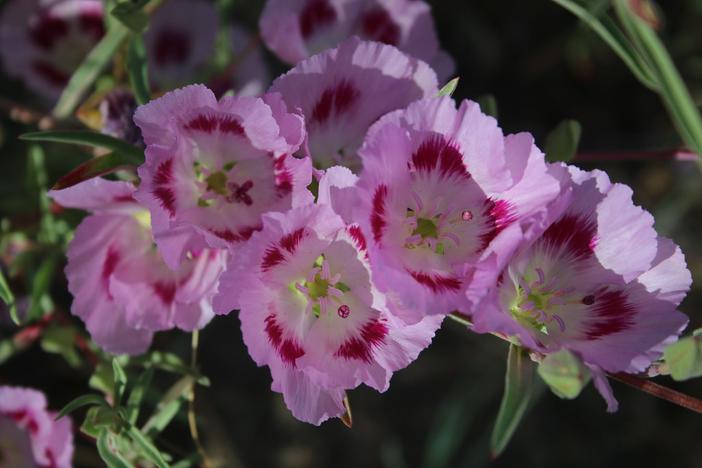Redspot Clarkia
(Clarkia speciosa)
Redspot Clarkia (Clarkia speciosa)
/
/

Joe Decruyenaere
CC BY-SA 2.0
Image By:
Joe Decruyenaere
Recorded By:
Copyright:
CC BY-SA 2.0
Copyright Notice:
Photo by: Joe Decruyenaere | License Type: CC BY-SA 2.0 | License URL: https://creativecommons.org/licenses/by-sa/2.0/ | Uploader: joedecruyenaere | Publisher: Flickr























Estimated Native Range
Summary
Clarkia speciosa, commonly known as Redspot Clarkia, is an annual herb that thrives in the chaparral and open woodlands of Central California. It is particularly adapted to the Mediterranean climate of its native region, with hot, dry summers and mild, wet winters. This species exhibits a range of growth forms, from decumbent to erect, with stems reaching up to half a meter in length. The inflorescence is either open or dense, featuring flowers in various stages of bloom alongside several closed buds. Unique to this plant, the sepals separate from each other as the buds open. The fan-shaped petals can be lavender, pink, or deep red, often with a paler base and occasionally showcasing a large, bright red spot near the center. Flowering occurs from late spring to early summer, adding a splash of color to the garden.
Redspot Clarkia is valued for its vibrant flowers and adaptability to a range of garden settings, including wildflower meadows and informal borders. It is relatively low-maintenance, requiring only moderate watering and thriving in well-drained soils. Full sun exposure is ideal for promoting vigorous growth and abundant flowering. While it is not commonly afflicted by serious diseases or pests, it can be susceptible to powdery mildew in humid conditions. As an annual, it completes its life cycle in one season, but it can reseed itself, ensuring a display for the following year.CC BY-SA 4.0
Redspot Clarkia is valued for its vibrant flowers and adaptability to a range of garden settings, including wildflower meadows and informal borders. It is relatively low-maintenance, requiring only moderate watering and thriving in well-drained soils. Full sun exposure is ideal for promoting vigorous growth and abundant flowering. While it is not commonly afflicted by serious diseases or pests, it can be susceptible to powdery mildew in humid conditions. As an annual, it completes its life cycle in one season, but it can reseed itself, ensuring a display for the following year.CC BY-SA 4.0
Plant Description
- Plant Type: Herb
- Height: 0.4-1 feet
- Width: 0.12-0.3 feet
- Growth Rate: Moderate
- Flower Color: Pink, Red, Purple
- Flowering Season: Spring, Summer
- Leaf Retention:
Growth Requirements
- Sun: Full Sun
- Water: Medium
- Drainage: Medium
Common Uses
Bee Garden, Bird Garden, Butterfly Garden, Deer Resistant, Drought Tolerant, Hummingbird Garden, Low Maintenance, Showy Flowers
Natural Habitat
Chaparral and open woodlands in the Mediterranean climate of Central California
Other Names
Common Names:
Scientific Names: , Clarkia speciosa,
GBIF Accepted Name: Clarkia speciosa F.H. & M.E.Lewis